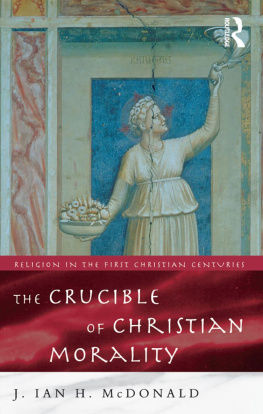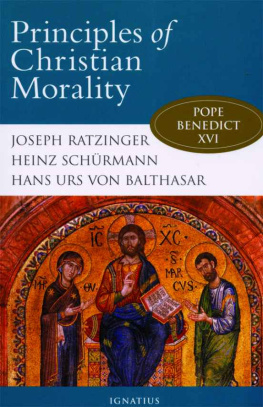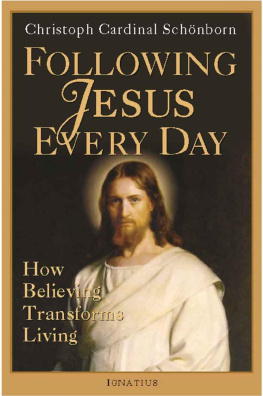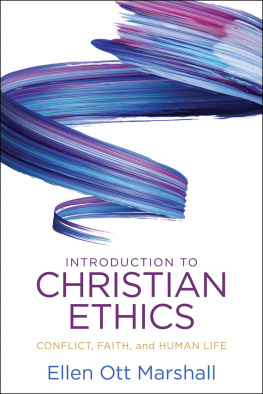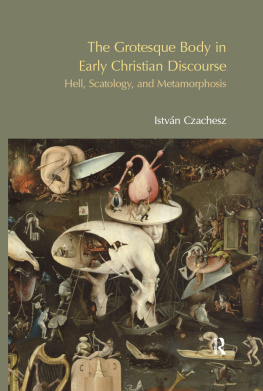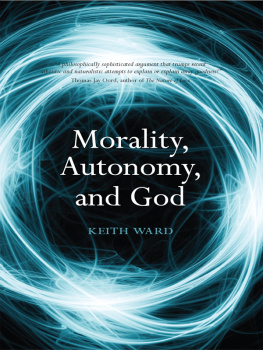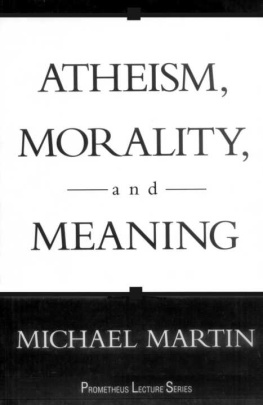THE CRUCIBLE OF CHRISTIAN MORALITY
The Crucible of Christian Morality explores the notion of Christian ethics and discusses its roots, its significance in developing moral standards throughout the world and its relevance in todays society.
Ian McDonald begins with a study of the ethos of the early Christian communities. He pays particular attention to the relation of cosmic vision to moral attitude and authority, noting also the types of moral discourse used. He then traces the roots of these developments to the Old Testament and to the ministry of Jesus. The second half of the book concentrates on selected moral themes, concerned with persons, with communities in societies and with virtue or moral excellence, setting them in the context of ancient cultural developments.
The Crucible of Christian Morality develops new critical perspectives, in particular, the sociology of knowledge and discourse analysis, and challenges conventional approaches by focusing on the ethos of communities rather than isolated documents, to shed new light on the nature of Christian morality in its earliest and most formative years.
Ian McDonald is a Reader in Christian Ethics and New Testament Studies at the University of Edinburgh. He is the author of Biblical Interpretation and Christian Ethics (1993) and Christian Values (1995).
RELIGION IN THE FIRST CHRISTIAN CENTURIES
Edited by Deborah Sawyer, University of Lancaster, and John Sawyer, Professor Emeritus, University of Newcastle
Too often the religious traditions of antiquity are studies in isolation, without any real consideration of how they interacted. What made someone with a free choice become an adherent of one faith rather than another? Why might a former pagan choose to become a Godfearer and attend synagogue services? Why might a Jew become a Christian? How did the mysteries of Mithras differ from the worship of the Unconquered Sun, or the status of the Virgin Mary from that of Isis, and how many gods could an ancient worshipper have? These questions are hard to answer without a synoptic view of what the different religions offered.
The aim of the books in this series is to survey particular themes in the history of religion across the different religions of antiquity and to set up comparisons and contrasts, resonances and discontinuities, and thus reach a profounder understanding of the religious experience in the ancient world. The first topics to be covered will include: women, sacred languages and sacred texts; ritual and sacrifice; purity.
THE CRUCIBLE OF CHRISTIAN MORALITY
J. Ian H. McDonald
First published 1998
by Routledge
2 Park Square, Milton Park, Abingdon, Oxon OX14 4RN
Simultaneously published in the USA and Canada
by Routledge
711 Third Avenue, New York, NY 10017
Routledge is an imprint of the Taylor & Francis Group, an informa business
1998 Ian McDonald
The right of Ian McDonald to be identified as the Author of this Work has been asserted by him in accordance with the Copyright, Designs and Patents Act 1988
Typeset in Garamond by Routledge
All rights reserved. No part of this book may be reprinted or reproduced or utilised in any form or by any electronic, mechanical, or other means, now known or hereafter invented, including photocopying and recording, or in any information storage or retrieval system, without permission in writing from the publishers
British Library Cataloguing in Publication Data
A catalogue record for this book is available from the British Library
Library of Congress Cataloging in Publication Data
A catalogue record for this book has been requested
ISBN 0415118581 (hbk)
ISBN 041511859X (pbk)
CONTENTS
I am grateful to the editors and publishers for the opportunity to develop the present volume in relation to a series such as Religion in the First Christian Centuries. While it is the case that too often the religious traditions of antiquity are studied in isolation, this observation is doubly applicable to what is usually termed New Testament ethics. The challenge is not only to recognise the interdisciplinary nature of the subject but to develop a method which accords with the logic of the study of religion, ethics and culture while relating to more specialised interests in the field. The success or otherwise of the attempt made in the present volume to address such a daunting task must be left to the reader to judge.
I have received encouragement and practical help from many quarters, which I can only inadequately acknowledge here. I am grateful to Richard Stoneman of Routledge and to the series editors, Deborah and John Sawyer, for putting the proposal to me, for helpful guidance in the preparation of the book and for accepting it for publication. I benefited from presenting some of the material in and above all my wife Jenny, without whose constant encouragement and practical help the writing of the book amid all the pressures of academic life would have been even more difficult than it was.
Ian McDonald
Edinburgh
December 1997
The title of this book signals several of its leading concerns. Its focus is on the making of Christian morality, one of the great moral traditions in world history. It follows the convention of using the term morality of moral practice and discourse relating directly to it, while ethics is reserved for secondary reflection on morality. Thus while a study such as this is part of ethical enquiry, its subject-matter is the developing moral ethos of the early Christian communities. The term crucible indicates that the early Christian communities, in their various settings, were something of a melting-pot in which materials and traditions derived from a variety of sources Jewish and Hellenistic, scriptural and messianic, charismatic and sapiential were forged into a new and distinctive moral outlook. It suggests lively interaction, refinement, change and transformation, until a new product emerges, tested as by fire.
This type of approach may be contrasted with more traditional ways of studying New Testament ethics, a discipline which itself manifests several different varieties.
DIACHRONIC OR HISTORICAL MODELS
From the time that Hermann Jacoby published his Neutestamentliche Ethik in 1899, scholars have given attention to the moral teaching contained in the books of the New Testament. The impetus for much of this effort arose from the desire of critical scholars to shake off the shackles of traditional dogmatism and rediscover the historical roots of the Christian moral tradition. However, the nineteenth-century historical quest proved to be at least as vulnerable to ideological conditioning as its predecessors, and the Jesus of history and Jesus as moral teacher tended to reflect nineteenth-century idealism in a marked way. The work of Johannes Weiss and Albert Schweitzer presented a radical challenge to such procedures by highlighting the factor of eschatology in relation to both Jesus and Paul. Scholars had now to come to terms with the fact that the first-century social and religious context was radically different from that of the twentieth.
Essential tools for further research on the moral teaching of Jesus were found in source and documentary criticism, which concentrated on the earliest forms of written tradition, and subsequently in form and redaction criticism (Formgeschichte and Redaktionsgeschichte) which placed greater emphasis on the setting of the material in the life of the faith communities and on the relation of redactors or editors to it. To be sure, the centre of concern was frequently the historical Jesus or the

